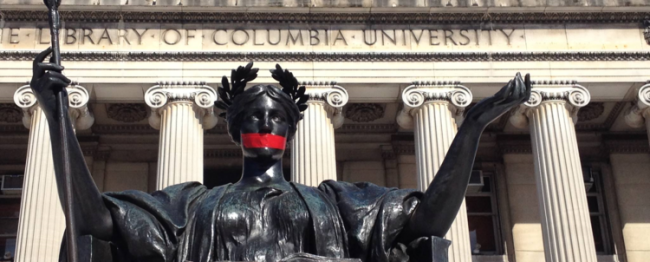You have /5 articles left.
Sign up for a free account or log in.

An image used by the activist group No Red Tape during 2014 protests against the handling of sexual violence at Columbia University.
No Red Tape
Columbia University has reinstated the diploma of a 2017 graduate of its journalism school, who was found responsible for sexually assaulting a fellow student, retroactively expelled and had his degree revoked.
Ben Feibleman and Columbia recently reached a settlement on a lawsuit he filed in 2019 against the university, for what Feibleman’s attorney, Kimberly Lau, called a “grievously mishandled” investigation by the university. The university concluded shortly after Feibleman graduated that he had sexually assaulted a female student who was too intoxicated to consent to sex in 2016. Feibleman claimed that the student did not show signs of incapacitation, that she made sexual advances toward him and that the university had incorrectly found him guilty of the assault. The outcome, he argued, was fueled by gender discrimination and public pressure on the university at the time to crack down on campus sexual misconduct, according to court documents.
Though Columbia reinstated Feibleman's degree, a spokesperson said in a statement that the university stands by its finding that Feibleman committed sexual assault. But Lau, a partner at Warshaw Burstein LLP and chair of the law firm’s Title IX and College Discipline Practice, said in an interview that the reinstatement of Feibleman’s degree and the “significant” financial payment he will receive as part of the settlement is an admittance of wrongdoing by the university, even if it’s not outright.
“You don’t give somebody a red cent or give them back their diploma if you believe in these findings,” she said. “I think that says it all.”
Despite Feibleman’s detailed record of his evening spent with the female student who accused him of rape, including 744 photos, 13 videos and 30 minutes of audio recording that includes their sexual encounter, there remained significant questions in court about what occurred between the two students, said Jake Sapp, a legal researcher for the Stetson University Center for Higher Education Law and Policy, who focuses on Title IX, the law prohibiting sex discrimination at federally funded institutions. Sapp said he’s been following the case since last year. The settlement was first reported by the New York Times.
Valerie Caproni, a judge for the New York district court where Feibleman’s lawsuit was filed, said in a February 2020 opinion that the case “illustrates the complexities of policing sexual misconduct on college and university campuses.” The records and other evidence cited in Feibleman’s lawsuit could prove either that the female student was too intoxicated to consent or that she was not incapacitated and Feibleman had received her consent, she wrote.
For example, the female student apparently did a “backwards somersault” on the edge of a 30-foot water tower located on a New York City rooftop, then grabbed a ladder to descend, court documents said. But she also was observed falling asleep before she and Feibleman went back to her apartment and the alleged assault occurred, according to the court documents.
But Sapp said the settlement was reached due to Feibleman’s effective claim that there were clear missteps by the Title IX investigator and panel of three Columbia officials who looked into and decided Feibleman’s case. Feibleman said that he was discouraged from hiring an attorney while his accuser had retained one, he was given a warning for speaking to a classmate about the case while she was permitted to discuss it and he provided evidence disputing the complaint that was ignored by the investigator.
University officials made similar missteps in a case that was disputed in New York federal appeals court during the same year that Feibleman’s accuser filed her complaint, in which a federal judge determined a male student could effectively claim that a female student was given “preferential treatment” during a Title IX process by Columbia officials, Sapp said. He believes the missteps in both cases were in part caused by Columbia’s attempt to “swing back” and recover from public scrutiny the university faced between 2014 and 2016 for previous Title IX processes that were said to mistreat survivors of sexual assault.
The U.S. Department of Education's Office for Civil Rights opened an investigation into Columbia’s alleged failure to investigate a separate rape complaint made by another female student around the time that Feibleman’s case was being investigated, which put the university under additional scrutiny and pressure to find male students guilty of sexual assault, Feibleman’s lawsuit claimed. It was also around this time that Emma Sulkowicz, a 2015 Columbia graduate who said she was sexually assaulted while a student, drew national attention to the university when she carried a mattress around campus to protest Columbia’s determination that no wrongdoing was done by her alleged assailant.
Colleges, over the last decade or so, have been “stuck between the rock and a hard place” since the Department of Education under former president Barack Obama issued a Dear Colleague letter, or written advisory, in 2011 that warned colleges of consequences at the federal level if reports of sexual misconduct weren’t appropriately dealt with, Sapp said.
“You had the Dear Colleague letter in 2011 that said, get out there and find these people responsible, or you’re not only going to be fined but publicly you’re going to lose a lot of credibility with this young, woke generation,” Sapp said. “You’re going to be blasted for mishandling sexual misconduct.”
Sarah Nesbitt, a policy and advocacy organizer for Know Your IX, a group that advocates for the rights of survivors of sexual assault, said more often, male students accused of sexual assault are using public scrutiny or even their college’s mere following of the 2011 Dear Colleague letter as an argument that their Title IX process was biased. Characterizing the letter as strictly in favor of those who report sexual assault, namely women, has “taken the teeth out of civil rights reports all together,” Nesbitt said.
“The focus needs to be on equitable access to education, as is the focus to Title IX, but it’s becoming a matter of accountability for men’s rights,” she said. The lawsuits claiming gender bias against men can potentially “have a negative ripple effect on chilling survivor reporting,” she said.
Nesbitt noted that the Columbia settlement does not represent an “exoneration” of Feibleman. To survivors, however, the settlement coupled with the university maintaining that Feibleman is guilty of misconduct is a signal that the university is “protecting its bottom line” rather than continuing to dedicate legal and financial resources to fighting the lawsuit, she said.
“It calls into question where schools’ allegiance lies in terms of protecting civil rights,” she said. “This settlement and others send the message to [accused students] that accountability from their school doesn’t really mean much. And to survivors, that they can’t actually depend on schools for accountability … It becomes more of a war of attrition.”
For his part, Feibleman said in a statement that he was “given no choice” but to sue Columbia for its mishandling of his Title IX case.
“They decided to revoke my diploma and end my career,” he said. “This was the only way I could see to clear my name.”
“The system is both unfair to complainants, who can be misled, ill advised and abandoned by the institution, and to respondents, who are often deceived into thinking that the process leads to truth, rather than a predetermined outcome,” Feibleman added. “Columbia’s process failed all parties. I and the woman have had to live with this for four years now, and will continue to for the rest of our lives.”




